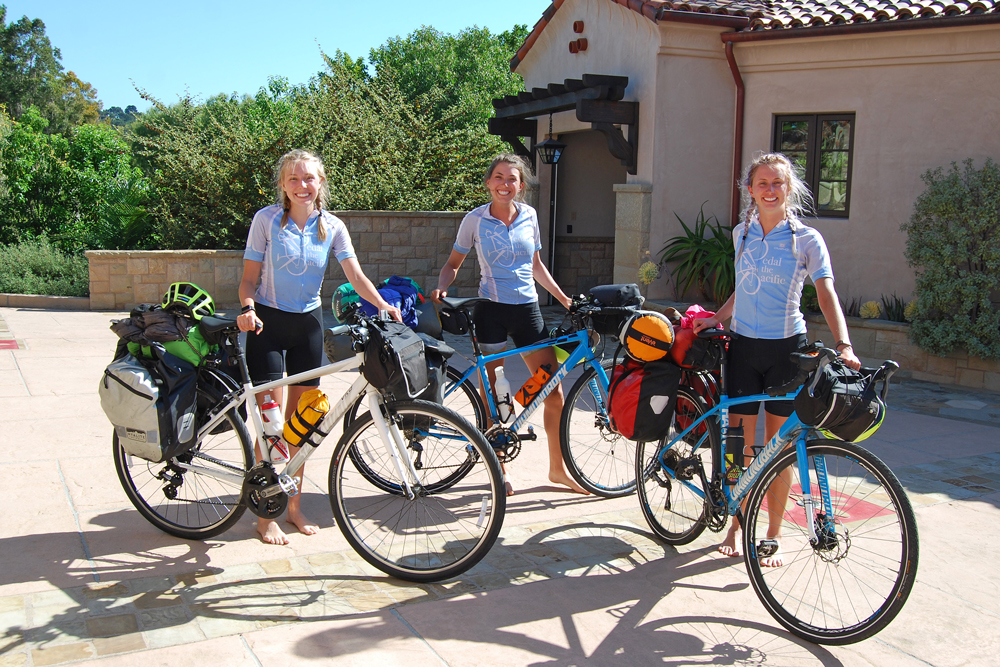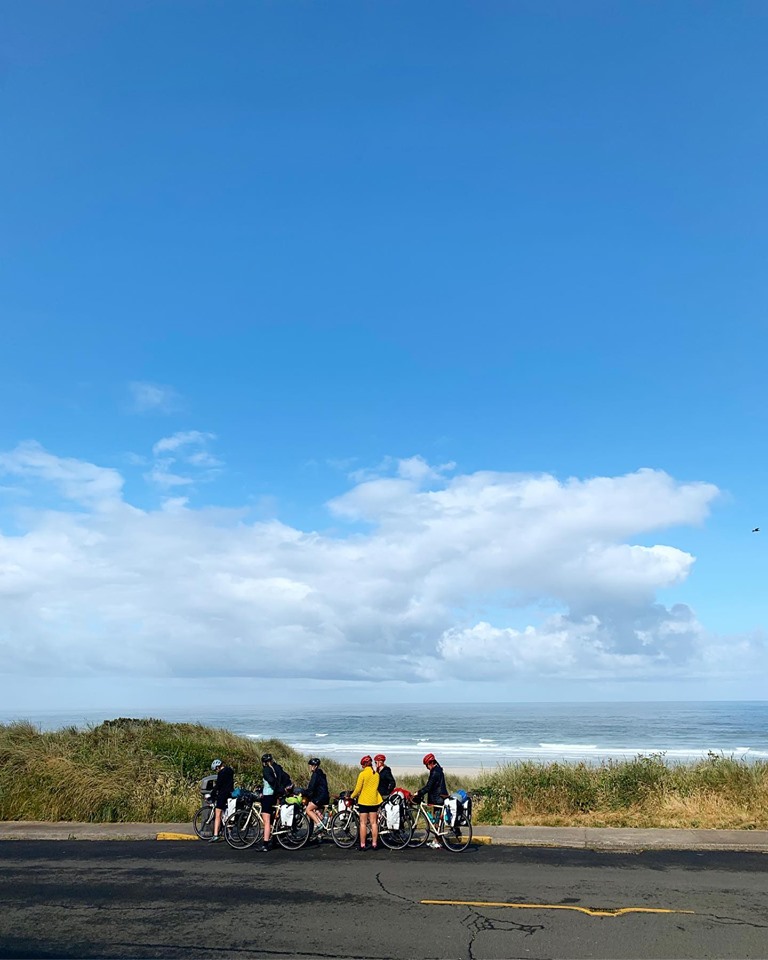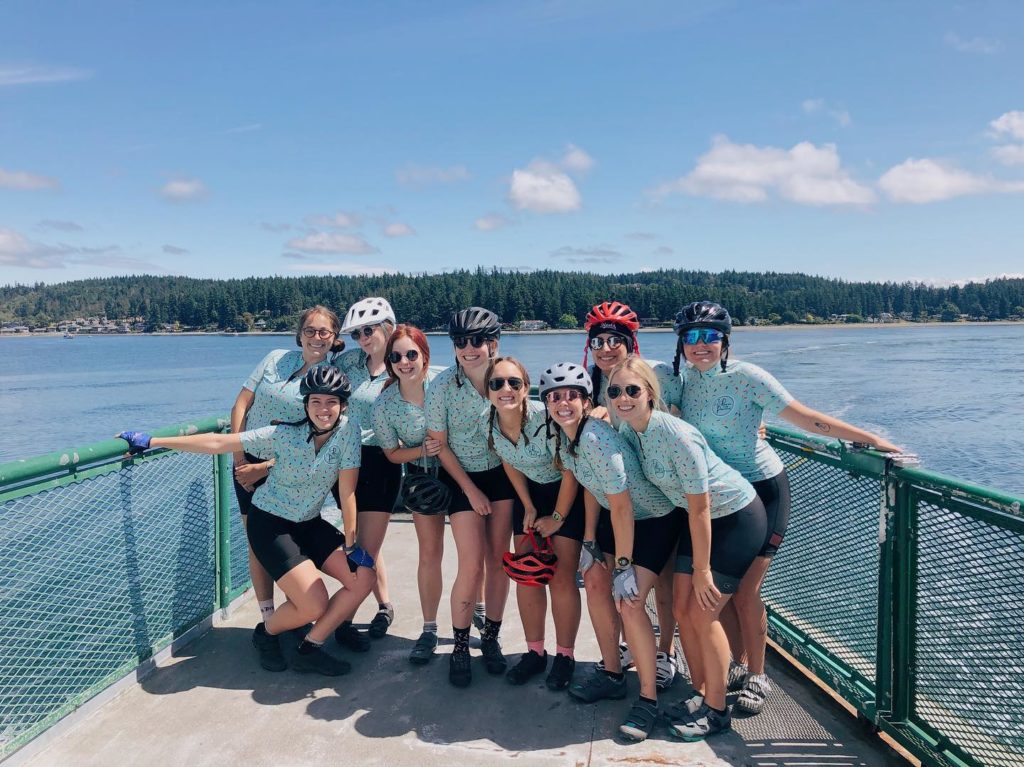It’s a little known fact that sex trafficking is a multi-billion dollar industry in the United States. For the past three years, Chi Omega Sisters, along with other college-aged women across the country, have been deeply committed to eradicating this practice through their annual fundraising endeavor: Pedal the Pacific.
In 2017 when Sara Belmer, now an alumna of Psi/Arkansas, began Pedal the Pacific with two of her friends, she said, “We were three very normal college girls. We had an idea and wanted to help make a difference.”

Their goal? To raise awareness and funding for the opening of The Refuge Ranch for Domestic Minor Sex Trafficking (DMST) in Austin, Texas.
After a highly successful first ride—a mere 1,700 miles down the West Coast—Pedal the Pacific gained a massive following and participation grew, with 83 women applying to be part of the adventure, and 11 making the team. Among those 11 were two more Chi Omega Sisters, Mattie Claire Carranza, now an alumna of Psi/Arkansas, and Lizzie Sammons, Tau Beta/ Oklahoma State. Through pledges and donations received along their route, awareness of modern-day slavery was heightened, and more than $147,000 was raised to help young sex trafficking survivors reorient their lives.
This year Haley Felix, Tau Beta/Oklahoma State, carried the Chi Omega torch as she biked down the coast in hopes of reaching this year’s goal of $250,000.
Human Trafficking and Pedal the Pacific
“To me, the overall mission and cause of Pedal the Pacific is women fighting for other women,” says Lizzie.
The founder of The Refuge noticed the vast discrepancy in the need for support and the resources available for young girls coming out of these traumatic situations. Thanks in part to the funds raised from the 2017 Pedal the Pacific trips, a facility was created to help narrow that discrepancy.
Today the Refuge is a long-term, residential, therapeutic community for 48 girls, minors through age 19, who have been rescued out of sex trafficking. Built from the ground up on 50 acres, The Refuge provides trauma-informed, holistic care for the girls on site, including: a University of Texas Charter School program, a medical clinic staffed by community partners, and various therapeutic programs uniquely designed for the development of a child survivor.
“Pedal the Pacific gave me a way to do something about the problem of sex trafficking instead of just being infuriated by it and moving on. It was a way to use the resources I have to change the lives of the girls who end up at The Refuge,” says Lizzie Sammons.
One year after her ride, Mattie is still shaken about her experience and the reason that she was riding.
“I remember what the cause meant to me and how it rattled me to my core. It was something so much bigger than ourselves, doing the riding, or the people donating. The cause meant freedom for girls whom I might not ever meet. It meant that there was long-term healing on the horizon for girls who may have thought their lives had no purpose, meaning, or significance. While I rode my bike, it meant that it was worth the sacrifice and worth the countless conversations, educating people who had never heard of sex trafficking. There were people that we encountered who did not know that people, young and old, were being sold into modern-day slavery.”
Preparing for the Journey
When Haley first heard about Pedal the Pacific, she was immediately drawn to the cause but admits she didn’t know how to pursue it because she had no experience in cycling. She says, “Eventually, a friend of mine convinced me to apply. As interviews for the 2019 team approached, I decided that I should do some research as to why a team of young girls, clueless about biking, would commit to such a big dream. That’s when I realized the true motivation behind biking over 1,700 miles.”

As she geared up mentally and physically to participate in the 2019 bike, Haley knew the ride itself would bond the team even more, but she said, “We had a team retreat in mid-November in Austin, Texas, where the entire team met, learned more details about The Refuge, and bought our bikes. Since then, our team has been chatting through group messaging and video conference calls. Although we hadn’t spent much physical time together, I already felt that our team was pretty unified and would get along well. I could not think of a better group of girls with whom to fight sex trafficking.”
When it comes to training, what started out as a lot of short rides and simply getting comfortable on their bikes, escalated to learning to ride comfortably next to cars, clipping their official bike shoes in and out efficiently, and adding weight to their rides.
“In our last month of training, we were getting comfortable with big rides and putting weight on our bikes. It was a pretty brutal ride, averaging about 40–60 miles daily with approximately 40 lbs. on our backs,” said Haley.
Although the 1,700-mile trip was carefully planned, mapping out their path and establishing the team’s mileage each day, the number of days can end up varying slightly from year to year. Last year, the team began in Seattle, traveled down the coast through San Francisco, and finished in San Diego, having just five days of rest scheduled intermittently into their 45-day itinerary. They averaged about 42 miles daily and approached 60 miles on some days.

“I was one of two girls in charge of mapping out the route down the entire coast. Seeing some of the hills, daily elevation gain, and mileage opened my eyes to the true difficulty of the trip. I wasn’t worried about the ride, but there were some learning curves for sure,” said Haley.
By night, the women bunked and boarded either at campsites or with welcoming families who provided warm showers, comfortable beds, delicious meals, and good conversation. This rest was short-lived, as they prepared themselves for the early morning that awaited them.
Power Through the Tough Moments
When asked about the toughest portions of their trek all of the women had moments to share about bike piece malfunctions, falls, being tired, sore, chaffed, sunburnt, tough sleeping conditions, or waking up every morning having to psych themselves up for another full, brutal day of 40–60 miles. But one constant rebuttal to these tough moments was that it was all, without a doubt, worth it.
“One recurring theme throughout hardships of the trip was comparing our petty struggles to what the girls we’re riding for have been through. We all found ourselves in little or big struggles bringing our focus back to why we ride, and the situations that we are trying to aid these girls to overcome. That mindset made everything that went wrong for us seem so small in the grand scheme of our trip and our goal,” says Lizzie.
Connecting with the Team and with Sisters
As one could imagine, these conditions and sharing this common motivation creates a unique bond that becomes unmatched. Although not all team members are Chi Omegas, the women quickly form their own sisterhood on the trail.
“This might sound funny, but you don’t have the option to not connect with the women you ride with. We spent every moment together: the good, the bad, and the delirious. It wasn’t peachy sometimes, but it was fun and we really learned how to work together when we practically started the trip as strangers. We ended as family and women I truly believe in—some of the strongest people I have ever known,” says Mattie.
The women have described their experiences with Pedal the Pacific as life-changing and bestowed their team members with traits such as “strong,” “bold,” “tender,” “wise,” and “vulnerable,” saying they couldn’t have asked for a better group of role models to ride with as they mobilize their communities to make a change.
When faced with such a daunting issue and sense of responsibility, remaining discouraged never is crucial for these women.
“Pedal the Pacific represents that the fight is not over. It has given me a deeper understanding of what it means to be ‘discouraged never.’ I have a role to play and can’t afford to sit back passively,” says Mattie.
Bella Young, Xi Kappa/Texas A&M, joins the 2020 team this year. For more information on applications, donations, and the team visit pedalthepacific.com.
